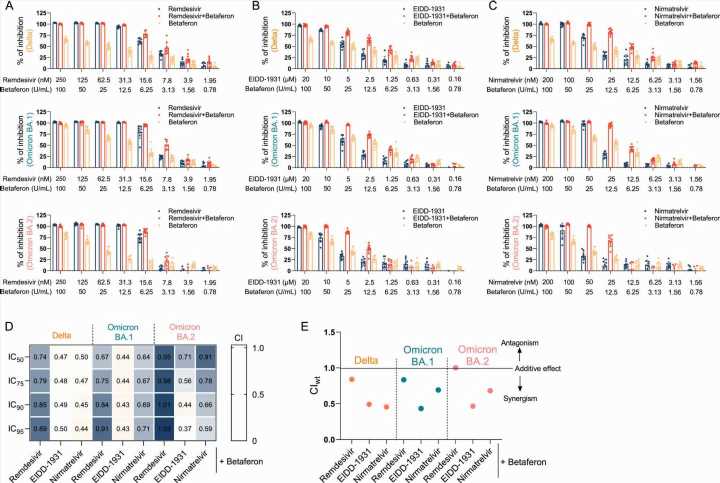![Antiviral effects of approved anti-SARS-CoV-2 drugs in combination with interferon-β (betaferon) against delta, omicron BA.1, and omicron BA.2 isolates. Betaferon was tested in fixed combinations combination with remdesivir (A), EIDD-1931 (B), or nirmatrelvir (C) in SARS-CoV-2 (MOI 0.01)-infected Caco-2-F03 cells. Values represent mean ± S.D. of three independent experiments. D) Combination indices were calculated at the IC<sub>50</sub>, IC<sub>75</sub>, IC<sub>90</sub>, and IC<sub>95</sub> levels following the method of Chou and Talalay. E) The weighted average CI value (CI<sub>wt</sub>) was calculated according to the formula: CI<sub>wt</sub> [CI<sub>50</sub> + 2CI<sub>75</sub> + 3CI<sub>90</sub> + 4CI<sub>95</sub>]/10. A CI<sub>wt</sub> <1 indicates synergism, a CI<sub>wt</sub> =1 indicates additive effects, and a CI<sub>wt</sub> ˃1 suggest antagonism. Credit: <i>Journal of Infection</i> (2022). DOI: 10.1016/j.jinf.2022.07.023 Identification of effective combination therapies for COVID-19 that may reduce the formation of novel variants](https://scx1.b-cdn.net/csz/news/800a/2022/identification-of-effe.jpg)
COVID-19 is anticipated to keep causing regular outbreak waves for the foreseeable future. The recent COVID-19 waves have caused fewer hospitalizations and deaths than the initial ones, which is largely due to the immunity provided by vaccines. However, many people have defects in their immune systems and cannot effectively protect themselves from COVID-19 by vaccination. Such individuals depend on effective antiviral therapies when they are infected.
Moreover, resistance formation to antiviral drugs is known to happen quickly in viruses and has, for example, caused major problems with the treatment of HIV. However, more effective combination therapies can reduce or even prevent resistance formation.
The first resistance mutations have already been detected in samples of SARS-CoV-2, the coronavirus that causes COVID-19. Novel and resistant variants seem to predominantly emerge in individuals with immune defects, who suffer from long-term infections because they cannot effectively clear the virus. Thus, effective combination therapies are also needed that suppress the formation of new, resistant SARS-CoV-2 variants.
Currently, there are three approved antiviral drugs for the treatment of COVID-19: remdesivir, molnupiravir, and nirmatrelvir (the active agent in paxlovid). Moreover, aprotinin is an approved drug, whose anti-SARS-CoV-2 activity was discovered by the same research team, and it was recently shown to be beneficial in COVID-19 patients.
To find more effective COVID-19 therapies, an international team led by Professor Jindrich Cinatl (Institute of Medical Virology, Goethe-University), Professor Martin Michaelis, and Professor Mark Wass (both School of Biosciences, University of Kent) tested the sensitivity of different SARS-CoV-2 omicron and delta viruses to combinations of the four antiviral drugs with betaferon, which belongs to the interferons, an additional class of antiviral drugs that are also naturally produced in the body and protect it from virus infections.
The findings revealed that interferon combination with molnupiravir, nirmatrelvir, and aprotinin were much more effective than interferon combinations with remdesivir. This may explain why remdesivir/ interferon combinations have so far shown limited improvement compared to remdesivir alone. Based on the current findings, interferon combinations with the other three drugs are much more promising and should be tested in the clinics.
Professor Jindrich Cinatl (Goethe-University and Dr. Petra Joh Research Institute) added, “If these findings are confirmed in patients, I hope that more effective therapies will help us to reduce the formation of novel dangerous COVID-19 variants.”
Professor Martin Michaelis, University of Kent, said, “These are exciting findings that will hopefully help to improve the treatment of vulnerable COVID-19 patients and to avoid the formation of resistant viruses as much as possible.”
Source: Read Full Article
